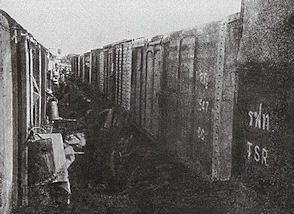Return to Changi
From Tanbaya to Kanburi
 There was an improvement in the food at Tanbaya with the addition of prawns from the coast, although after the trip of 200 odd miles from the sea to Tanbaya in an open non refrigerated truck took a toll on the prawns, they were still a welcome addition to the rations. The men were so desperate for any food that they thought nothing of cooking and eating flyblown meat or in this instance - prawns.
There was an improvement in the food at Tanbaya with the addition of prawns from the coast, although after the trip of 200 odd miles from the sea to Tanbaya in an open non refrigerated truck took a toll on the prawns, they were still a welcome addition to the rations. The men were so desperate for any food that they thought nothing of cooking and eating flyblown meat or in this instance - prawns.
Once the rail line was joined the rumour was that all the prisoners would be returning to Changi (remember that they were "on loan" from Changi to the Jap railway divisions) although most believed that they would be left to die and rot in Tanbaya or turned loose in the jungle to die anyway.
Finally the prisoners were loaded into steel rice wagons with 29 men to a wagon, where there was not enough room for anyone to lie down. To try and ventilate the wagons the sliding doors were generally left open. The journey took 5 days and 6 nights and for men in such poor health many died during the trip to Kanburi. The only amusement for the prisoners was the regular derailments that occurred even though they had to work to lever the wagons back on the line - those derailments were a break from the boredom of the rail journey.
Bob's wagon derailed 13 times and once in the middle of a bridge which was a bit dangerous as the wagon had to be dragged off the bridge where it was found to be wrecked beyond track side repair. It was replaced by a wooden cattle wagon which was more comfortable as the sides were slatted wood and a bit cooler than the steel rice wagons. At one point a Jap troop train heading north pulled up beside Bob's wagon and they could see the Jap soldiers standing asleep while hanging by the chin on a rope strung down the centre of the wagon.
 Finally the train arrived at Kanburi and the prisoners were off loaded and put in tents for two weeks. Bob remembers being fed boiled duck eggs and lime tea. Many were so weak from disease, malnutrition, starvation and overwork that they died there when only a few days from the luxury of Changi at Singapore. So many of the PoWs that went up on the death railway were simply "worked to death" by the Japanese.
Finally the train arrived at Kanburi and the prisoners were off loaded and put in tents for two weeks. Bob remembers being fed boiled duck eggs and lime tea. Many were so weak from disease, malnutrition, starvation and overwork that they died there when only a few days from the luxury of Changi at Singapore. So many of the PoWs that went up on the death railway were simply "worked to death" by the Japanese.
Return to Changi
After a rest of about two weeks the remainder of Bob's "F" Force prisoners were loaded into trains for the journey to Singapore. What a shock awaited the returning prisoners - they were treated with suspicion and even disgust by those who never went up on the railway (Referred to as "Changi Chocos") and fenced in a special camp called the "southern area". In Bob's words "We were treated like lepers by the Changi Chocos" - no one believed that human beings could be in such a terrible physical condition and still be alive! To visit the main Changi Prison which was across the road, prisoners from the "southern area" had to obtain a pass and only a few were issued daily. No one in Changi wanted to know or associate with these poor skeletonised humans!

